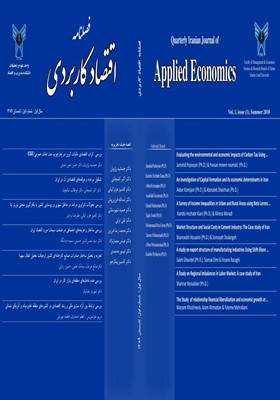تشکیل سرمایه و مولفههای اقتصادی آن در ایران
محورهای موضوعی : اقتصاد کاربردیاکبر کمیجانی 1 * , ابوطالب شالچیان 2 *
1 - ندارد
2 - ندارد
کلید واژه: سرمایهگذاری خصوصی, نرخ تورم, نرخ سود بانکی, سرمایهگذاری دولت,
چکیده مقاله :
این مقاله به بررسی تحلیلی عوامل و مؤلفههای اصلی تأثیرگذار بر سرمایهگذاری خصوصی میپردازد، شواهد تجربی و الگوهای گوناگون اقتصاد سنجی در اقتصاد ایران نشاندهنده اثربخشی تعداد زیادی از متغیرهای کلان اقتصادی بر سرمایهگذاری است که در این میان تأثیرپذیری سرمایهگذاری خصوصی در تعدادی از متغیرهای کلان بیش از دیگر متغیرها است. در این تحقیق متغیرهای اقتصادی درقالب مدل اقتصادسنجی مورد بررسی عبارتند از: تولید ناخالص ملی، نرخ تورم، نرخ سود سپرده بلندمدت بانکی (نرخ بهره)، سرمایهگذاری دولت، متوسط نرخ موزون ارز، تغییر در حجم تسهیلات اعطایی بانکها به بخش خصوصی و محدوده زمانی تحقیق سالهای 1350 لغایت 1383 میباشد. لازم به ذکر است که علاوه بر سنجش ارتباط بین متغیرهای اقتصاد کلان، روند تشکیل سرمایه، درآمد سرانه، شاخصهای معرف ظرفیت سرمایهگذاری نیز مورد بررسی تحلیلی قرار گرفته است.
This paper attempts to analyze the role of the main determinants of the capital formation and the behavior of private investment using the descriptive as well as econometric methods. Both the econometric methods and statistical analysis are indicating that most of the macroeconomic variables do play significant role in explaining the behavior of private investment in Iran. Variables examined for their influence on private investment over the period under study i.e. 1350-1383[1] are as follows: GDP, inflation rate, weighted average of the rate of return on long term deposits, government investment, effective exchange rate and the changes in the banking facilities to private sector. The findings in this paper indicate that Most of these variables, except the rate of return on banking facilities, have had the significant impact on private investment in the same direction as expected

